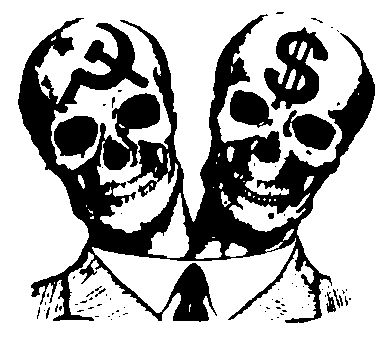
Communism failed and capitalism seems to be on
the brink of collapse: Can human beings come up
with a better way to organize society?
Gazeta, Russia
Beyond Capitalism
and Communism
"The magnitude of the current
global crisis isn't just unprecedented; after a short respite it clearly
promises even more overwhelming turmoil. It would seem time, finally, to think
not so much about rescuing national economies, but about ridding humanity of
similar disasters."
By Boris Tumanov
Translated
By Yekaterina Blinova
December 24, 2008
Russia - Gazeta
- Original Article (Russian)
"I believe that banking
institutions are more dangerous than standing armies … If the American people
ever allow private banks to control the issuance of their currency, first by
inflation and then by deflation, the banks and corporations that will grow up around
them will deprive the people of all their property until their children will
wake up homeless on the continent their fathers conquered."
Today, as the global
financial crisis is becoming almost a literal confirmation of these warnings,
it's hard to believe that they were uttered over two centuries ago, in 1802.
And then not by some economic “guru” of the era, but by a provincial (by
European standards of the time) named Thomas Jefferson, the third president of
the United States.
Nonetheless, let's be honest:
Thomas Jefferson was a well-educated man - known as a philosopher, agronomist,
architect and inventor. But his visionary discussions of the perils of the
banking system were clearly inspired not so much by a profound understanding of
economics, but practical experience dealing with banks as a Virginia plantation owner. In other words,
by elementary common sense.
The financial and economic
history of the United States,
and consequently of the entire world, has repeatedly (including during the
current crisis) confirmed the truth of Jefferson’s
prophecy. But his warning was soundly forgotten.
ZEITGEIST:
ADDENDUM - CRITIQUE OF THE U.S. BANKING SYSTEM
Humanity has preferred to see
this series of crises not so much as an indication of the inherent viciousness
of the “market economy,” but as proof of its ability to “rise from the ashes”
after another catastrophe, and, consequently, its suitability for continued
use.
Over time, in the perceptions
of those who were in some way touched by this process, the increasingly complex
market economy became a self-sufficient, self-regulated mechanism, existing
entirely independent of reality, including the ethical and moral needs of
humanity.
 Almost
half a century ago, in 1962, this phenomenon was concisely but exhaustively
described by American science fiction writer Clifford Simak in his novel They
Walked Like Men. It's a story about how some aliens, scrupulously
respecting our planet's legal codes in regard to real estate, make nearly the
whole of humanity homeless. Not as a result of some hateful intentions,
however, but solely as a consequence of following commercial objectives.
Almost
half a century ago, in 1962, this phenomenon was concisely but exhaustively
described by American science fiction writer Clifford Simak in his novel They
Walked Like Men. It's a story about how some aliens, scrupulously
respecting our planet's legal codes in regard to real estate, make nearly the
whole of humanity homeless. Not as a result of some hateful intentions,
however, but solely as a consequence of following commercial objectives.
[Editor's Note: The book is
about an alien conspiracy to legally buy the Earth. The aliens look just like
humans, and appear to have unlimited wealth  ].
].
Simak put his thoughts on the
matter into the mouth of an elderly shop owner, a distinguished representative
of a commercial dynasty from a small trading town in the American Midwest:
"People today have
forgotten what good manners are. They have forgotten what courtesy is. What
respect is. They haven't been brought up to think kindly of their neighbors.
The business world has become nothing but accounting transactions performed by
machines, or humans that mirror the thoughtlessness of machines. In the world
there is no honor, no trust, and its ethics have become those of a wolf fight.
[This is a translation from Russian - not the book's English edition].
A skeptic will necessarily
see that in light of the Marxian denunciation of the “inhuman nature of
capitalism,” the old trader wasn't saying anything new. But the crux of the
problem today is not how to determine who has made the better commentary on
this sad reality. And it isn't about gloating over the next crash of the
“country of the yellow devil,” in
other words, the United States. It is for us to ask ourselves a basic
question:
[Editor's Note: In the 1955
book Soviet Faustus by Bulat Galeyev, there is a chapter entitled Soviet
Faust in the Country of the Yellow Devil which is about the author's visit
to the United States in 1928-29. The book has never been translated into
English  ].
].
Can humanity come up with something more reliable than a system that repeatedly commits increasingly catastrophic failures, and in which human destiny is effected not merely on a national scale, but across the entire planet?
Karl Marx died with
confidence that unlike, let us say, Campanella  or Thomas Moore
or Thomas Moore  ,
he had invented an entirely realistic formula for the ideal society. Remember?
As soon as humanity reaches a certain level of productive power, the principles
of communism would enter into force - from each according to abilities, to each
according to his needs. This formula of universal welfare, understandable and
therefore unconditionally coveted by any peasant, implied by default that the
“level of productive power” would be consistent with the level of social consciousness,
which in turn would deter individuals from seeking to acquire four ocean
yachts, twenty “Bentleys” or “Jaguars,” or take trips to Courchevel in
the company of a battalion of long-legged maidens. [Courchevel is a ski area in
the French Alps].
,
he had invented an entirely realistic formula for the ideal society. Remember?
As soon as humanity reaches a certain level of productive power, the principles
of communism would enter into force - from each according to abilities, to each
according to his needs. This formula of universal welfare, understandable and
therefore unconditionally coveted by any peasant, implied by default that the
“level of productive power” would be consistent with the level of social consciousness,
which in turn would deter individuals from seeking to acquire four ocean
yachts, twenty “Bentleys” or “Jaguars,” or take trips to Courchevel in
the company of a battalion of long-legged maidens. [Courchevel is a ski area in
the French Alps].

This
isn’t the first time going beyond communism and
capitalism
has been suggested. This 1931 Nazi poster
reads:
'Death to Lies.' On the snake it says 'Marxism'
and
'High finance.'
In other words, Marx
sincerely - and quite logically - presumed that a moral and ethical component
in communist society is just as important as the level of production and
development. It would never have entered his mind that the growth in production
and of new technologies, unheard of in his time, would lead to the moral
degradation of humankind. That very state of which Simak's hero spoke with such
hopelessness.
The post-Soviet nouveau
riche amply demonstrate the consequences of the lessons of pseudo-voluntary asceticism
and communist “philanthropy,” which for decades were drilled into the heads of homo
sovieticus.
But in this sense, Russia is
merely a backward caricature of Western society. Just as most Western societies
look like caricatures of the communist society born of the imagination of Marx.
Indeed, from the
point of view of the founder of “scientific communism [Marx]” and upon closer
examination, the United States in recent decades, has nearly fulfilled his
principal condition, i.e., it has brought the development of productive power
up to the level required [to make true communism possible]. Moreover, American
citizens have achieved the standard of living promised by communism. That is, society
has asked each, including the dedicated unemployed, to live according to his
given ability, and has allowed each to live according to his given needs. And
this, as we now see, has culminated in a complete concurrence with Jefferson’s
prophetic warning. Most interesting, however, is that the banks are in essence
copying the behavior of the citizenry (or perhaps vice versa), seeking to
maximize profits, i.e., expand consumption, and assuming more obligations than
their actual financial resources allow.
The same
phenomenon can be observed in Europe, albeit on a smaller scale. The
platitudinous “Protestant ethic,” which supposedly calls for moderation, has
nothing to do with this. After all, the national ethos of the United States was
also created by “White Anglo-Saxon Protestants.” But the acquisitive vices of
each European nation are revealed on a scale that reflects the size of its
economy.
Simply put, there
isn't a whiff of morality in the situation. This assertion will hardly shock
those who remember the sad commentary of Jefferson’s contemporary, Adam Smith,
who in the late 18th century noted that the central purpose of man is vanity.
Hence, according to Smith, this is where the distortion of the “moral senses”
originates. And the mechanism of this distortion, according to Smith, is in the
following: "Worship of fame and riches replaces respect for prudence and virtue,
and disdain for poverty and misery is often more visible than disgust
towards vice and ignorance that accompany them [translated from Russian]." Meanwhile, the magnitude of the
current global crisis isn't simply unprecedented; after a short respite it clearly
promises even more overwhelming turmoil. It would seem time, finally, to think
not so much about rescuing national economies, but about ridding humanity of
similar disasters.


Adam
Smith and Karl Marx: Can we go beyond the theories
of
these men, which have so shaped modern civilization as
we
know it?
Naturally, we
should pay tribute to today’s economic and financial managers who, perhaps for
the first time in history, are attempting to coordinate their actions for a
comprehensive rescue, showing, albeit grudgingly, a sort of global solidarity.
But while in principle this is laudable activity, it is not nearly enough to
supersede the scope of "accounting transactions performed by machines, or
humans that mirror the thoughtlessness of machines."
In our world, constantly torn
by glaring contrasts of affluence and poverty, imperial ambitions, religious
and racial intolerance, egocentric national psychologies, the vanities of the
powerful and, finally, “vices and ignorance,” it would be irresponsibly
idealistic to propose as a panacea the next utopia, in the form of a call to
formulate a certain global ethic, including an ethic of consumption. Especially
when one sees that in the midst of the crisis, the consequences of which are
still impossible to predict, countries on which much of the planet’s future
depend continue to devote themselves to gleefully building geopolitical
Potemkin villages  - in Iraq or Afghanistan, and some in the
Caribbean Sea.
- in Iraq or Afghanistan, and some in the
Caribbean Sea.
And if the statement of this
reality confirms, even in the slightest degree, the hypothesis that mankind
represents the dead-end branch of evolution, then it is hardly significant in
what form our world - unipolar or multipolar - reaches that end.
CLICK HERE FOR RUSSIAN
VERSION
[Posted by WORLDMEETS.US
January 3, 1:23pm]